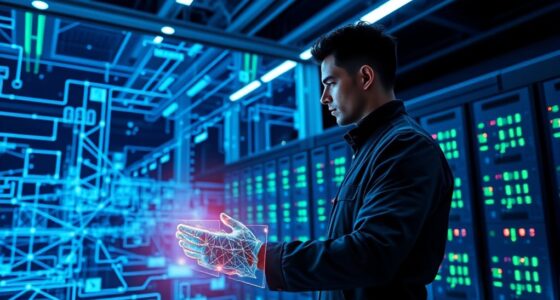I am always intrigued by the constantly changing field of AI security as a technology enthusiast. This silent force works diligently in the background to safeguard our digital space from potential threats that aim to endanger our data.
In this article, we will delve into the intricate workings of AI security, exploring its role in detecting and responding to cyber threats, enhancing data privacy and protection, and navigating the challenges presented by the Internet of Things.
Join me on this journey as we unravel the future of AI security together.
Key Takeaways
- AI security combines machine learning algorithms and adaptability to proactively identify and mitigate risks.
- AI security systems utilize advanced machine learning algorithms for real-time threat detection.
- Advanced AI technologies, such as data encryption and identity theft prevention, strengthen data privacy and protection.
- AI security plays a vital role in securing the growing number of connected devices in the era of IoT.
The Evolution of AI Security
The evolution of AI security has been driven by advancements in machine learning and data analytics. Machine learning algorithms have played a pivotal role in enhancing the capabilities of AI security systems. By analyzing vast amounts of data and identifying patterns, these algorithms enable AI systems to detect and respond to emerging threats with speed and accuracy.

With the ever-changing nature of cyber threats, AI security must constantly adapt to stay ahead. It’s crucial for AI systems to be able to learn and evolve in real-time, continuously updating their knowledge base to counter new and sophisticated attacks. This adaptability is what sets AI security apart, allowing it to proactively identify and mitigate potential risks before they can cause significant damage.
The combination of machine learning algorithms and the ability to adapt to emerging threats makes AI security a powerful and indispensable tool in safeguarding our digital world.
Detecting and Responding to Cyber Threats
As an AI security system, my primary function is to detect and respond to cyber threats. In real-time threat detection, I utilize advanced machine learning algorithms to analyze vast amounts of data and identify patterns indicative of malicious activity. This allows me to swiftly identify and neutralize potential threats before they can cause significant damage.
By constantly monitoring network traffic, system logs, and user behavior, I’m able to detect anomalies and suspicious activities that may indicate a cyber attack. Additionally, I’m equipped with automated response mechanisms that can isolate compromised systems, block malicious IP addresses, and alert security teams for further investigation.

Through my vigilant and proactive approach, I strive to ensure the safety and integrity of your digital world.
Now, let’s delve into the next section, which explores enhancing data privacy and protection.
Enhancing Data Privacy and Protection
To strengthen data privacy and protection, my focus lies in fortifying digital safeguards. Utilizing advanced AI technologies, such as data encryption and identity theft prevention, we can ensure that sensitive information remains secure and confidential.
Data encryption acts as a protective shield, converting data into an unreadable format, thereby preventing unauthorized access. This technology ensures that even if a breach occurs, the stolen data remains useless to cybercriminals.

Additionally, identity theft prevention measures help detect and prevent fraudulent activities by continuously monitoring user behavior, identifying suspicious patterns, and promptly alerting users of potential risks.
By implementing these robust security measures, we can safeguard our digital world against threats and protect the privacy of individuals and organizations alike.
Now, let’s explore how AI security extends its reach in the age of IoT.
AI Security in the Age of IoT
In my experience, amidst the era of IoT, AI security plays a vital role in safeguarding our digital world. As the number of connected devices continues to grow exponentially, so do the AI security challenges we face. Securing smart devices is crucial to protect against potential cyber threats and ensure the privacy of our personal information.

- AI security challenges:
- Vulnerabilities in IoT devices: With the proliferation of smart devices, hackers can exploit weaknesses in their security protocols, potentially gaining unauthorized access to sensitive data.
- Data privacy concerns: IoT devices collect massive amounts of personal data, raising concerns about how this data is stored, processed, and shared, and the potential for breaches or misuse.
- Securing smart devices:
- Robust authentication mechanisms: Implementing strong authentication methods, such as biometrics or two-factor authentication, can help prevent unauthorized access to IoT devices.
- Regular software updates: Keeping smart devices up to date with the latest security patches and firmware upgrades is essential to address known vulnerabilities and enhance overall security.
The Future of AI Security
Looking ahead, one key aspect to consider in the future of AI security is the scalability of protective measures as the number of connected devices continues to skyrocket. As the Internet of Things (IoT) expands, the potential attack surface for cybercriminals also increases exponentially. This poses significant challenges for AI security systems, which must adapt to secure an ever-growing network of devices.
Additionally, the future of AI security will need to address the ethical implications associated with the use of artificial intelligence in protecting sensitive information. One area of particular concern is AI security in financial systems, where the stakes are high and the consequences of a breach can be devastating.
As AI technologies continue to evolve, it’s crucial to develop robust and scalable security measures that can keep pace with the rapid advancement of connected devices while ensuring the protection of sensitive data and addressing ethical considerations.
Frequently Asked Questions
How Does AI Security Differ From Traditional Cybersecurity Measures?
AI security differs from traditional cybersecurity measures by utilizing advanced AI algorithms and machine learning. It enables proactive defense through real-time monitoring, automated responses, and adaptive security. Human intervention is still necessary for advanced analytics and anomaly detection.

What Are the Potential Risks and Challenges Associated With Implementing AI Security?
Implementing AI security comes with potential risks and challenges. Scalability issues may arise as the system needs to handle large amounts of data. Ethical concerns must also be addressed to ensure responsible use of AI technologies.
Can AI Security Effectively Protect AgAInst Emerging Cyber Threats?
AI security effectively protects against emerging cyber threats, but it has limitations. The applications of AI security are vast, but it can still be outsmarted by sophisticated attackers. Continued research and development are necessary to enhance its capabilities.
How Does AI Security Address Privacy Concerns and Ensure Data Protection?
AI security effectively addresses privacy concerns and ensures data protection by implementing robust data privacy regulations and utilizing advanced AI algorithms for threat detection. It is the silent sentry that safeguards our digital world.
What Role Does AI Security Play in Securing the Internet of Things (Iot) Devices and Networks?
AI security plays a crucial role in securing IoT devices and networks. Leveraging machine learning, it enhances protection by detecting and mitigating threats. Advancements in AI security have significant implications for the future of IoT, ensuring a safer digital world.

Conclusion
In conclusion, AI security has emerged as a powerful and essential tool in safeguarding our digital world.
With its ability to detect and respond to cyber threats, enhance data privacy and protection, and adapt to the ever-growing challenges of the IoT era, AI security offers a promising future.
As we continue to rely on technology for our daily activities, the silent sentry of AI security becomes an indispensable guardian, ensuring our safety and preserving the integrity of our digital lives.










